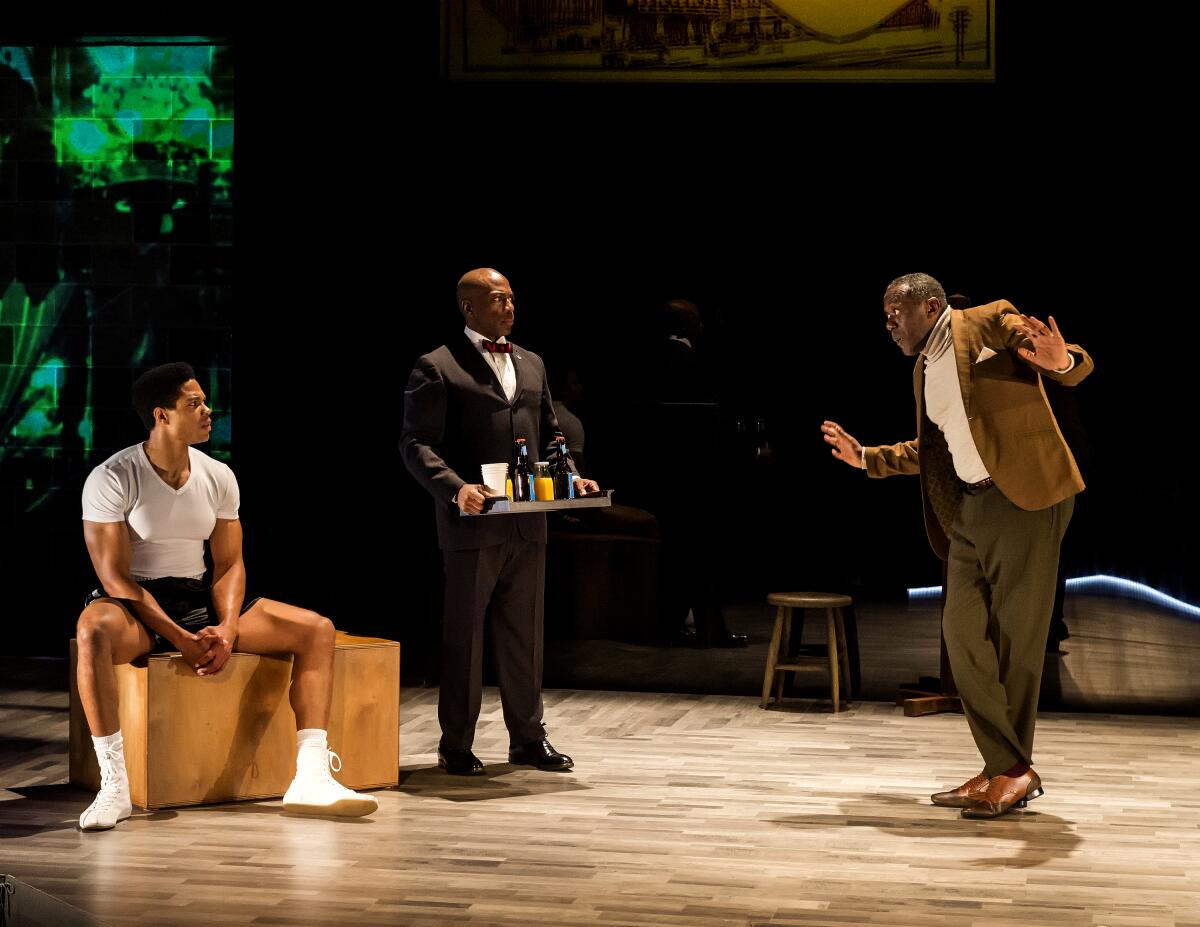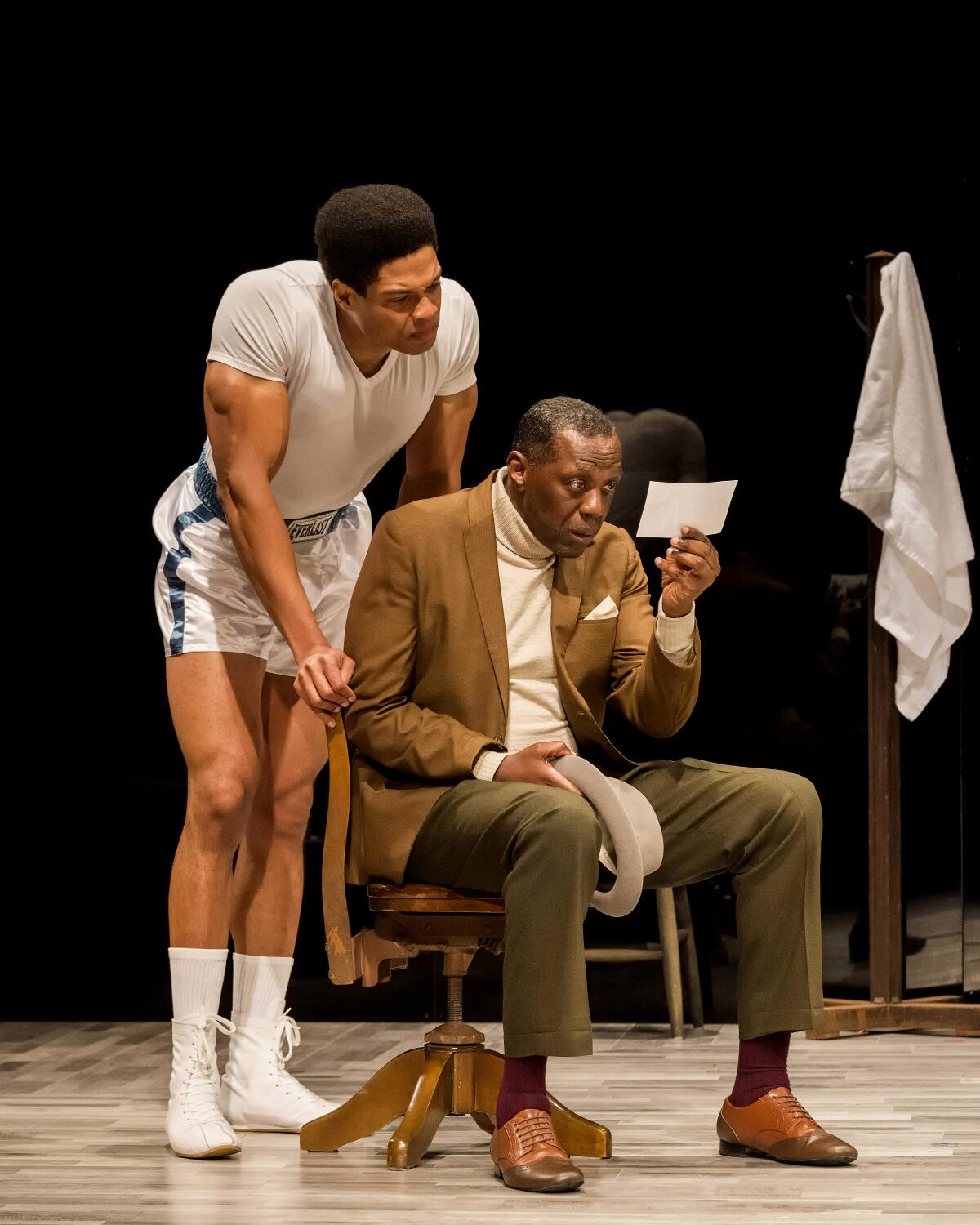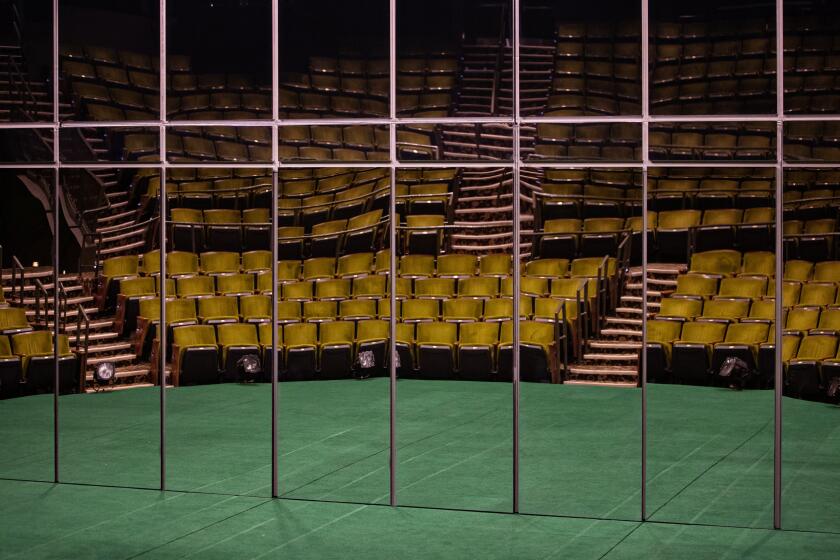A powerfully acted play examines Muhammad Ali and Stepin Fetchit’s unlikely friendship

- Share via
It would be hard to imagine two more divergent personalities than heavyweight champion Muhammad Ali and Hollywood comedian Stepin Fetchit. Temperamental opposites, they formed an improbable alliance when Ali was about to make good on his claim of being the greatest of all time and Fetchit, a former movie star, was being called out by civil rights leaders for the way his onscreen characters perpetuated racial stereotypes.
Their friendship is the basis of Will Power’s “Fetch Clay, Make Man,” which had its premiere at Princeton’s McCarter Theatre Center in 2010. A study in contrasts, the play broadens our understanding of these cultural figures, examining them against the backdrop of their different histories and challenging our assumptions about what empowerment looks like.
“Fetch Clay, Make Man,” which opened at the Kirk Douglas Theatre on Sunday, meanders. The play lacks the structural compression needed to create an illusion of dramatic inevitability. But the work attains an impressive power in performance.
Center Theatre Group announced that it is indefinitely halting programming at the Mark Taper Forum, L.A.’s flagship theater. CEO Meghan Pressman and incoming artistic director Snehal Desai explain their rationale for the controversial decision.
Vitality is found not in the plot but in the clash of theatrical styles of the two main characters. The leads are extraordinary. Ray Fisher incarnates, with natural majesty, the brawn and bravado of Muhammad Ali; Edwin Lee Gibson shambles and stammers as Stepin Fetchit while retaining the dignity of a canny survivor.
Under the nimble direction of Debbie Allen, the actors endow “Fetch Clay, Make Man,” produced in association with the SpringHill Company, with a flesh-and-bones truth that transcends the script. The cast, which includes a knockout performance from Alexis Floyd as Sonji Clay, Ali’s wife at the time, extends and enhances the tale through the movement and manner of the characters. (Scenic designer Sibyl Wickersheimer’s layout is vague except for Ali’s dressing room, but the ensemble is given plenty of room to maneuver.)
Students of acting — or just anyone who admires the art form — should rush to the Douglas to marvel at the eloquence of Gibson’s nonverbal performance. He is just as adept when dialogue is involved, but he communicates Fetchit’s entire history in his apologetic posture alone.

If Fisher’s charismatic Ali is an exclamation point, Gibson’s Fetchit is a question mark. Famous for playing feckless, servile clowns in the 1930s, Fetchit took on the role of the white man’s fool onscreen, on the condition that he be officially credited, decently compensated and in control of the extras in his contract. Dismissed in the mid-1960s as an embarrassing anachronism, he bobs and weaves in his own way as well as Ali. Quick to beat a retreat when confronted but willing to test new ground when the opportunity arises, Gibson’s Fetchit brilliantly embodies the crazy-as-a-fox interpretation of the character that Power advances.
Renowned for his lyrical flair, Ali savors the words that trip off his tongue. Drawing breath for speech seems to intoxicate him. Fisher beautifully inhabits Ali’s bodily grace.
Full of jovial bluster, Fisher’s Ali occasionally breaks his facade to reveal pangs of empathy and twinges of insecurity. It’s a challenging period for the boxing hero. The year is 1965, and he’s gearing up for a rematch with Sonny Liston, whom a year earlier Ali (then Cassius Clay) defeated to become World Heavyweight Champion. He’s expecting a more prepared and determined opponent this time around.
Ali, who recently converted to the Nation of Islam, is punctilious about matters of faith. He reprimands Sonji when she switches back into secular garb, but he bristles when his right-hand man, Brother Rashid (a commanding Wilkie Ferguson III), tries to control him with religious strictures.
Concern is growing over the boxing champ’s safety. The murder of Malcolm X has unleashed threats against Ali’s life. Ali plays it cool, never giving away exactly what he’s thinking, but he’s aware of dangers on multiple fronts.
The Wallis Annenberg Center for the Performing Arts honored siblings and entertainers Debbie Allen and Phylicia Rashad this month with “A Tale of Two Sisters,” a lavish party and three-part tribute in Beverly Hills that featured testimonials, thanks and performances from fellow entertainment industry legends.
Brother Rashid cannot fathom why Ali has summoned Fetchit, a Hollywood relic whose comic roles traded on offensive stereotypes. But Ali suspects that Fetchit, who was friends with Jack Johnson, the first Black World Heavyweight Champion, knows the secret of Johnson’s “Anchor Punch.” There are no lengths to which Ali won’t go to become invincible.
Thankfully, the odd couple relationship that develops transcends the “Anchor Punch” story line, which culminates in a mystical moment that evokes the Middle Passage scene in August Wilson’s “Gem of the Ocean.” Power doesn’t earn this shifting of theatrical gears. Earlier flashbacks involving Fetchit and Fox Studio boss William Fox (Bruce Nozick) provide important context for understanding Fetchit but probably could have been exchanged for some quick exposition.
It’s a pity that more time wasn’t devoted to Floyd’s Sonji, who is warned by Fetchit about the risks of wearing a mask too long. (Born Lincoln Perry, he shares with Sonji that he essentially lost that identity by playing the role of Fetchit too well.) Sonji keeps annoying Brother Rashid by calling her husband Cassius. Ali doesn’t appreciate it either. Like his new friend, he has had to remake himself. How else can he beat the white man at his own game?
Winning, however, exacts a staggering personal cost. This stark reality is made painfully real in the flashes of regret that cross Ali’s face and in the occasional bursts of defiant self-assertion that Fetchit, to his credit, doesn’t always walk back.
'Fetch Clay, Make Man'
Where: Kirk Douglas Theatre, 9820 Washington Blvd., Culver City
When: 8 p.m. Tuesdays-Fridays, 2 and 8 p.m. Saturdays, 1 and 6:30 p.m. Sundays. Ends July 18. (Call for exceptions.)
Cost: $30-$79 (subject to change)
Running time: 2 hours, 15 minutes, with one intermission
Info: (213) 628-2772, centertheatregroup.org
COVID protocol: Check centertheatregroup.org/safety for current and updated information.
More to Read
The biggest entertainment stories
Get our big stories about Hollywood, film, television, music, arts, culture and more right in your inbox as soon as they publish.
You may occasionally receive promotional content from the Los Angeles Times.












